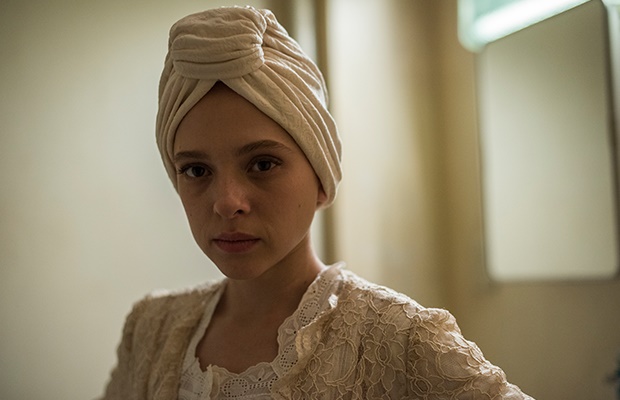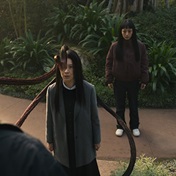
OUR RATING
4/5 Stars
WHAT IT'S ABOUT:
Esther 'Esty' Shapiro is a young woman of nineteen who has lived her entire life as part of the insular Satmar Hasidic community in Williamsburg, Brooklyn, but between a failing marriage and the oppressive, patriarchal attitudes of those who see her as nothing but a wife and baby-making machine, she decides that enough is enough and flees to Berlin to begin a new life. Based, loosely, on a true story.
WHAT WE THOUGHT:
More even than the Amish, the Satmar Hasidim are something of a mystery to all but those who are part of their community. And this despite being a significant presence in the suburb of Williamsburg in Brooklyn, New York for nearly a century. As such, along with being a gripping tale of one woman's fight for independence, a large part of the appeal of Unorthodox, the new, four-part limited series made specifically for Netflix, is its examination of this highly insular community of Ultra-Orthodox (or Haredi) Jews.
Now, being a practising Modern-Orthodox Jew, I am more aware of the Satmars than most, but even I went into Unorthodox not knowing too much about them beyond a few relatively broad facts. And, no, despite some recognition of their more universal Jewish practices, I didn't come away from the series relating to them much more than an entirely secular non-Jew would. Despite also falling under the broad and fairly arbitrary umbrella of "Orthodox Jewry", the difference between being on the liberal side of Modern Orthodoxy and those, like the Satmar Hasidim, who fall to the far-right side of Ultra-Orthodoxy is, to say the least, significant.
The Satmars, a relatively modern sect whose origins can be traced back to Hungary in the early 20th century, started off wanting nothing to do with the Western world in which they found themselves but, after being nearly entirely wiped out in the Holocaust, have since become even more particular about creating an invisible but impenetrable wall between themselves and not just non-Jews but from virtually all other kinds of Jews as well. They live in a major suburb of Brooklyn but speak primarily Yiddish and have almost nothing whatsoever to do with American society around them. They are also the Jewish religious group that is the most vehemently anti-Zionistic. In comparison to them, the Haredi community depicted in Netflix's Israeli import, Shtisel, are the very picture of secular modernity.
What may well be my biggest complaint with Unorthodox – a German production that is mostly in Yiddish but with liberal amounts of English, as well – is that its relative brevity (3.5 hours is long for a movie but incredibly short for a TV series) prevents it from going too far in-depth into the Satmar community – especially as it has a number of ex-Satmar consultants on hand to give the thing a real sense of authenticity. Indeed, Deborah Feldman, the author of the autobiography on which Unorthodox is broadly based (Unorthodox: The Scandalous Rejection of My Hasidic Roots) was fairly hands-on in working with the show's creators, Anna Winger and Alexa Karolinski. To bring her story and the community from which she fled to life.
It has come under fire by some for being too critical of and even misrepresenting the Satmar community, and it has come under fire by some for being not critical enough of a community that has remained blissfully untouched by the progressive values of the past 200 years. Personally, I consider it to be more accurate than most allegedly Jewish TV shows and movies and far more even-handed at its portrayal of the Satmar Hasidim, even if, by its very nature, it's clearly quite critical of them too.
Crucially, considering that it's exactly this sort of community that has been the victims of violent, antisemitic hate crimes in the US over the past couple of years, it's important to note that this is not a hateful portrayal of the Satmar Hasidim. It is highly critical of the Satmar community's outmoded views of women and its oppressive refusal to allow its members to go "off the derech" (to leave their predetermined path, basically), but it is also an honest and balanced view of a very singular way of life that doesn't rely on cheap sensationalism to get its point across. It also makes abundantly clear that, like the Amish, the Satmars may be religious fundamentalists, but their ultimate goal is complete isolation rather than any desire to impose their beliefs on others. You may strongly disagree with their beliefs and practices (don't get me started), but they're the farthest thing from a threat to general society as it is possible to get.
Most importantly, the reason why Unorthodox works as well as it does is that the very particular case of the life and times of the Satmar Hasidim is merely the context for a very universal story about a young woman finding her way in the world and asserting an independence from what other people want her to be. So, yes, it's certainly true that it's the exotic nature of the context of the show that provides a novel and intriguing perspective on a familiar story, it's exactly that familiarity that makes it resonate as profoundly as it does.
A large part of this is down to Israeli actress, Shira Haas, as our young heroine. Haas, who is also a major player on Shtisel, is simply superb as Esty, belying the fact that she's acting in a language not her own. She has an extraordinarily expressive face, and her ability to express vast amounts of thoughts and emotions wordlessly means that the writers don't need to burden her with expository dialogue and can just allow her to carry the entire series on her shoulders alone. Not that the rest of the international cast (many of whom having never acted before) aren't excellent too, but this is obviously Esty's story, and it's one that will no doubt bring international acclaim (and hopefully some awards recognition) to the none-more-deserving, Shira Haas.
Esty's story is told by flashing back and forth between her present in Berlin, where she meets an eclectic group of musicians who help her explore both her new-found freedom and the possibility of her pursuing a career in music too, and her past in Williamsburg and her grossly dysfunctional arranged marriage to Amit Rahav's Yakov (or Yanky as he is known). The astonishing thing about the juxtaposition of the two periods in Esty's life isn't just the way that some events mirror each other but that the flashbacks to what is, at most, three years prior, look like they're taking place in the Shtetls of Eastern Europe some two-hundred years ago. Only the modern New York backgrounds and the occasional glimpse of technology betray that impression.
Rahav is exceptionally good as Yanky, and he is almost as much the main character as Esty herself. Their marriage is undoubtedly depicted as hellish, but to the show's great credit, rather than making him a cartoon villain, he is depicted as a complicated and fundamentally decent person who is simply the product of a very restrictive system. Even as you cheer Esty on in her new life, it's hard not to feel a bit heartbroken for Yanky as his life is upended by something he absolutely does not understand.
Also of note is that between these two worlds and our two main characters is Esty's estranged mother, Leah (British actress Alex Reid, who is probably the most experienced actor here), who left the Satmar community herself when she was younger and is living with her non-Jewish, female lover in Berlin. Leah, Esty and Yanky share almost no scenes in the present until the final episode, but the entire series plays out like a dance between the three of them.
Admittedly the series does lose some credibility in its redundant but undeniably otherwise effective thriller elements that sees Yanky and his scummy cousin, Moishe, try and chase down Esty in Berlin, but this does little to detract from this engrossing, solidly (if sometimes, superficially) told and enlightening miniseries. When my biggest complaint about it is that I really wish it had an extra episode or two to flesh things out, you know it's doing something right.
And be sure not to miss the fascinating "making of" mini-documentary also available on Netflix now. It really adds to the miniseries itself.
WATCH THE TRAILER HERE:




 Publications
Publications
 Partners
Partners















